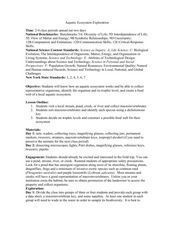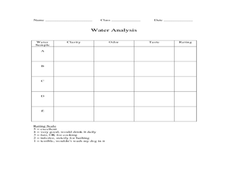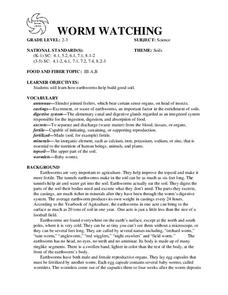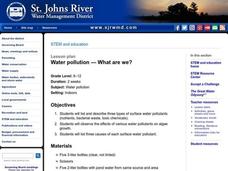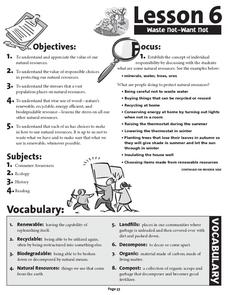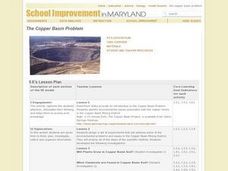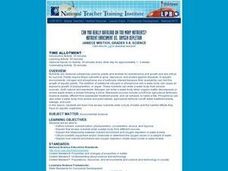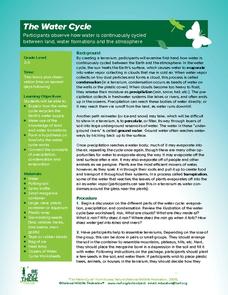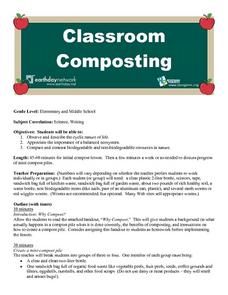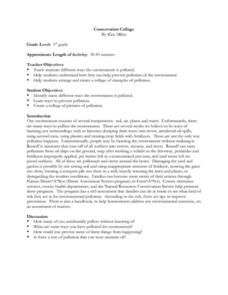Curated OER
Aquatic Ecosystem Exploration
Students visit a local stream, pond, creek, or river and collect macroinvertebrates. They sort macroinvertebrates and identify each species using a dichotomous key. Students decide on trophic levels and construct a possible food web for...
Curated OER
Runoff: Intro to Watersheds
Students are taught that a watershed is, what types of basic land cover are impermeable and permeable to water. They trace the flow of water around their school and around their home. Students determine what watershed their school is a...
Curated OER
Bottled Water vs. Tap Water
Students analyze the similarities and differences between tap water and bottled water. They make informed decisions about their use of each. Students are asked if they drink mostly tap water straight from the tap or water fountain. They...
Curated OER
WORM WATCHING
Students investigate how earthworms help build good soil. They examine the worms carefully to find the ringlike segments and swollen band at the front of the earthworm's body. Students take turns dampening the soil every day and adding...
Curated OER
What Are We?
Students list and describe three types of surface water pollutants. They observe the effects of various water pollutants on algae growth. Three causes of each surface water pollutant is listed.
Curated OER
Waste Not Want Not
Young scholars are introduced to the need to save natural resources. Through inquiry, hands-on activities, and problem solving, students increase their understanding of solid waste materials and the need to reduce, recycle, and reuse.
Curated OER
Living Corn Necklace
Fifth graders explore heredity and observable traits through experimentation. They view several different types of corn and record their observation of physical traits on a class chart. They create a corn necklace by sprouting dried...
Curated OER
Animals and Their Biomes
Students categorize animals according to their natural biomes using biome and animal flashcards.
Curated OER
The Copper Basin Problem
Students view a video about how human actions impact the environment. They design a set of experiments to address some of the problems and issues raised by the video.
Curated OER
Dishing the Dirt Part 3
High schoolers collect and examine different soil samples. They test for specific types of soil elements and the pH level. They answer questions about optimum growing conditions as well.
Curated OER
The Water Cycle and Sources of Pollution
Learners make an island that has a construction site on it. They spill siulated pollution and trash on top of the island and then water it to simulate rain. They will observe how the rain washes dirt, sand, and pollution off the island...
Curated OER
Applying the Laws of Inheritance
Biology and mathematics can be integrated through a study of Mendelian Genetics.
Curated OER
Glaciers Worksheet #1
The landscape impacted by glacier activity is drawn at the top of this worksheet. Ten multiple choice questions follow, some relating to the diagram, and some about the quality of soil left by glaciation. It is not often that you come...
Curated OER
Nutrient Enrichment vs. Oxygen Depletion
Learners investigate how excess nutrients enter a body of water, and the harmful effects they have on aquatic organisms.
Curated OER
HAPPY SOIL, SAD SOIL
Students will be able to identify the characteristics of healthy soil and unhealthy soil.Take the class outside to an area of thick grass near trees, if available. Compare the
clothes people wear to the thin cover. Discuss the reasons...
Curated OER
Animals
First graders study the basic needs of animals and compare them to human needs. They make bird feeders using milk carton and pine cones. They review the basic needs of food, water, air, and shelter and discuss what happens when animals...
Curated OER
Root, Root, Root for the Nutrients
Students observe the growth of a seed, predict what will happen when seeds are planted without soil, and conduct an experiment using a hydroponics system.
Curated OER
The Water Cycle
Students are introduced to the components and importance of the water cycle. They are shown how groundwater moves using a model. Students list 9 places on earth where water is found. They define the terms cycle and water cycle.
Curated OER
Renewable vs. Non-Renewable Resources
Fifth graders identify renewable vs. non-renewable resources and comprehend why conservation of resources is important. They are asked what they think the words natural and resource mean. Pupils then put the words together to define...
Curated OER
Volcanoes:How Safe Are They?
Young scholars explore volcanoes, locate them on maps, record general information about volcanoes, and organize information on a fact sheet.
Michigan Sea Grant
Water Quality
Learners observe water samples and measure the samples' water quality. Students develop their own criteria for measuring water quality and test for temperature, acidity, oxygen levels, turbidity, conductance, sediment and hardness.
Curated OER
BIOASSESSMENT OF STREAMS
Students work as a team to gather organisms from a stream to evaluate if the water quality is excellent, good, or fair to poor.
Curated OER
Classroom Composting
Learners discover the benefits of composting. They identify the steps of decomposition as well. They are read a book and discuss what items decompose.
Curated OER
Conservation Collage
Students identify many different ways the environment is polluted, and determine ways to prevent pollution. They create a collage of pictures describing how the earth becomes polluted.


